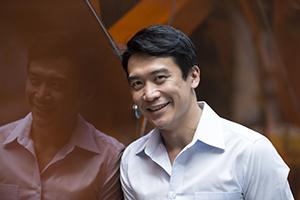
Courage, as defined by the Oxford dictionary, is 'the ability to do something that frightens one' and 'strength in the face of pain or grief'. But how exactly does it show in everyday life?
To Mr Neo, every waking moment entails a conscious act of courage. Courage is taking the bus alone. Courage is looking past the curious eyes and indifference of others. Courage is taking every day in stride, despite being partially blind and dependent on dialysis for life.
Neo - as he amiably requests to called - was born into a large family of 13. The second youngest among three brothers and nine sisters, Neo suffered a traumatic injury to the eye during infancy when he fell from a baby hammock. For all his life the world has been a perpetual blur.
Three years after he turned 30, Neo was informed by the doctors that his kidneys had failed. What started out as a seemingly negligible itch on his back had ultimately ended up with him needing dialysis. As the only member of his family to be diagnosed with kidney failure, Neo was at a complete loss.
"I didn't know what dialysis was. I thought it was a 'typical' medical procedure, something that I just need to do once, and then I can go home completely cured," he recounted. It was only with the patient explaining from the doctors and social workers that he understood that dialysis entailed a lifetime of treatment.
Having been on dialaysis for more than 17 years, several bumps - called aneurysms - are visibly present on both of his arms, testimony of prolonged dialysis. While these are symbols of his struggle and strength, they are also the subject of strange looks from others.
"People seem to be scared when they see it (the bumps), like I am a carrier of some disease. Others are just kaypoh, they will probe and ask why my arm looks different," he shared.
Moreover, his visual impairment paradoxically gave him greater clarity on the realities of society and the indifference of some.
"People can be very cold. Sometimes when I need help locating a certain place, I will ask strangers for help, and there will be people who will just walk away. There are also those whose concern is just for show; when you really need help, you will realise that they've just taken two steps back," he bemoaned.
Neo takes all these in his stride and tells me that he is no longer bothered by the curious looks and murmurs behind his back, or the curt indifference of others. "I just don't take it to heart, I live as I please," he said.
Yet, Neo was never a natural optimist. Few years into his dialysis, the idea of quitting treatment consumed his thoughts. "I was very disheartened," was his reply when I asked him why. He then continued to tell me how tired he would be after each dialysis session, the muscle cramps that would soon follow, and the mental challenge of adhering to the dietary restrictions.
"I can't eat this and I can't eat that, but when I look at other people, they are enjoying their food freely. What a life!" he said.
Despite living under the same roof as his brother and his niece and nephews, Neo appears to be rather withdrawn. At home he is either doing household chores or watching television alone in the room, he sometimes sings to himself.
He tells me he has no friends, none at all. "It is difficult to communicate with others and to truly understand each other," he says. "We enter the world alone and leave the world alone, so we have to get used to being by ourselves".
Neo's best friend and only confidant had been his mother, who was his main caregiver until she passed away about 10 years ago. The only people that he talks to now are the nurses at the dialysis centre, and occasionally, his family members - although this sometimes involves the nagging of his younger nieces and nephews.
"I used to be quite lonely, so I started to chat and joke with the KDF nurses. They were the reason I changed my mind and decided to continue dialysis. Talking to the nurses and knowing that someone cares about you gives you the motivation, the courage, and the heart to step into the dialysis centre. You get very disheartened if the nurses can't be bothered," said Neo frankly.
Conceivably, his concerns may seem frivolous to some. But perhaps, beneath the surface lies a deeper sense of perceived inequality; a sense of being different from others.
At a point during my chat with Neo, he told me how he would sometimes observed people and there would be a big group of friends talking and laughing loudly together, then he faintly said: "it would be good if I had a healthy body". The longing in his tone was hard to mistaken.
Many times during our chat he mentioned the word 'courage'. Courage is exactly the strength that commands him to face his illness and impairment, and also what gets him through each trying day.
Although the mind may waver from time to time, true courage is pressing on despite all the adversities life throws in one's direction. We are unable to fight the battles of others, but the one thing we can do is to provide them with the support they need.
Every contribution sparks a glimmer of hope that will continue to fuel kidney patients with the courage to press on with the life-sustaining dialysis treatment. You can support them by making a donation via www.kdf.org.sg or https://www.giving.sg/kidney-dialysis-foundation today. Your contribution would be entitled to 2.5x tax deduction and will help to subsidise their treatment costs and lighten their financial burden.






